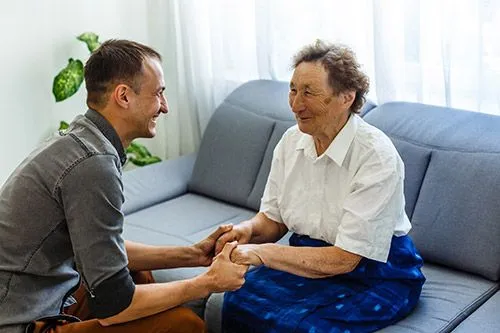Caregivers Need Care Too
23 April 2024
Caregiving Caretakers signs of caregiver stress The Birches at Villa Rica
Caretakers are often unsung heroes. The love and care they provide cannot be measured. One important thing that is often forgotten is that caretakers need care too. Here are a few tips to to help those who are so giving of themselves.
Create a support network
One of the most essential parts of caretaking is building a support system. Caretaking is much more than taking care of a loved one. It also involves a myriad of other activities including coordinating with doctors, nursing care and even mountains of paper work. It is essential to build a support network early in the caregiving role. Some other resources include:
- Family and friends can be one of the best options to help. Talk with them and share the journey that is coming and create a network to help. It can include simple things such a creating a meal train or helping to clean.
- Look for support groups offered through local hospitals, libraries, area agencies on aging, senior centers and mental health advocacy organizations. Groups like these will often provide free and discounted resources, guidance for dealing with difficult situations and the invaluable insights of those who have already navigated caregiving challenges.
Ask for help
It can be difficult to ask for help in any situation, but it is especially essential in a caregiving situation. If you are overwhelmed, showing signs of caregiver stress ask for the help you need. There is absolutely no shame in asking for help. Many medical providers and patient advocates from local medical facilities have people dedicated to this. Checking with these organizations and individuals is an excellent place to begin.
Self-care
Caregiving can be extremely stressful mentally, emotionally and physically. While most caregivers are focused on a loved one, it is vital to also remember to take care of yourself. Caregivers also have to think of themselves in order to give their loved on the best care possible. The three things most import to remember include:
- Getting enough sleep. Sleep contributes to overall heath and well-being. During sleep, the body recovers, heals and develops the resources needed to support everyday activities, including caregiving. A healthy sleep routine includes going to bed and waking at the same time each day; if possible in a caregiving role. Some helpful tools for good sleep can be using room darkening curtains, lowering the room temperature and not using digital devices in the bedroom with the hour before going to sleep.
- Balanced nutrition. Eating healthy can sometime be difficult in a caregiving situation. Try to include a variety of real, whole foods in your diet while enjoying sweets and treats in moderation. Packed foods and boxed foods may be convenient, but most do not have the vitamins, minerals and nutrients that it needs for optimal function. Without a balanced diet, stress can be felt more sharply. Guidance on healthy eating to support your caregiver role may be available at local hospitals and wellness centers through nutrition workshops.
- Physical movement. Exercise may be one of the last things that caregivers have on their mind. It may not be realistic as a caregiver to get three or four workouts in a week. Instead, aim for daily physical movement that gets your heart rate up for 30 minutes. This can be a walk, bike ride, working in a garden, yoga, taking a fitness class or turning on music and dancing in your living room. Movement releases hormones that help support a positive mood, strengthen the body and help relieve stress. Find something you enjoy and move every day.
Know the warning signs of caregiver stress
The stress of caregiving puts the caregiver at risk for health problems such as burnout, anxiety, depression, chronic fatigue, headache, sleep disturbances and relationship tension. If you are experiencing symptoms such as these, it is imperative to seek support and medical guidance so that you can recover your wellbeing and continue to be of support to your loved one. Many medical facilities and patient advocates are available for help. It also may be beneficial to talk to a therapist who specializes dealing with caregivers. Also, never underestimate the power of sharing with friends and family. The most important thing to remember is to ask for help.

